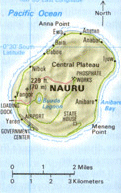

|



 Nauru
Nauru

|
Directory Information
|
Nauru is a small island country in the central
Pacific Ocean. It is part of Micronesia, one of the three
groups of the Pacific islands. Nauru consists of a single
island, which has an area of only 8 square miles (21
square kilometers). It is the third smallest country in the
world. Only Vatican City and Monaco are smaller. Nauru
is rich in phosphates-valuable chemical compounds
used in making fertilizers. Phosphate exports earn a
large part of the Nauruan governments revenue.
Nauru has no capital city. The main government of-
fices of the country are located on the southwestern
part of the island. The Australian dollar is Nauru's basic
unit of currency.
Nauru, an oval-shaped coral island, lies about
40 miles (65 kilometers) south of the equator. Most of
the island is a plateau, 200 feet (61 meters) high, which
contains deposits of phosphates. Near the center of the
plateau is a lagoon surrounded by a small area of fertile
land. Another belt of fertile land lies along the coast
Most of the people live along the 1 2-mile (19-kilome-
ter) coastline. In the past, the people raised their own
food. Now, they import most of their food and other
products they need. Nauru has a tropical climate that is
cooled by trade winds. Temperatures range from 76 'F
i24 'C) to 93 'F 134 'C). About 80 inches (200 centimeters)
of rain falls yearly.
People. About half of Nauru's population of 1 1,000
are Nauruans-people of mixed Polynesian, Microne-
sian, and Melanesian ancestry. They are Christians. Most
of them speak both the Nauruan language and English.
The rest of Nauru's people are from Kiribati, Tuvalu,
Hong Kong, and Australia. They come for limited peri-
ods of lime to help mine the phosphates.
The government provides Nauruans with modern
homes at low rents, and 2 government hospitals and 11
clinics give them free medical care. The law requires
Nauruan children between the ages of6 and 17 to at-
tend school. Nauru has five nursery schools, an elemen-
tary school, a high school, a Roman Catholic mission
school, and a teacher training college. The government
pays the expenses of students who attend universities in
other countries.
Economy. Phosphates are Nauru's only important re- source and the country's only export. A government- owned shipping company in Nauru serves many regions in the Pacific Ocean. A government-owned airline pro- vides service to many Pacific areas. Nauru's government encourages such local industries as fishing and canoe building. Products that are imported include automo- biles, food, furniture, machinery, medicine, and shoes.
Sources:



|